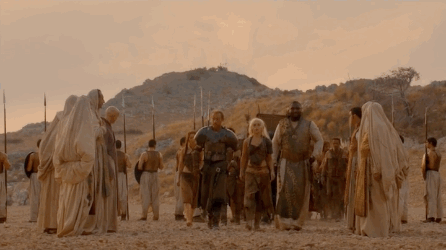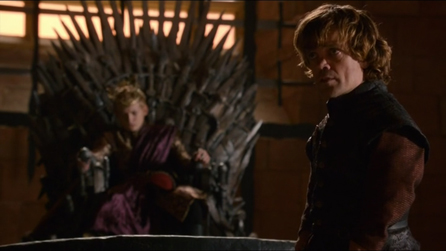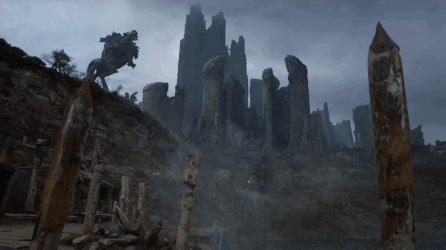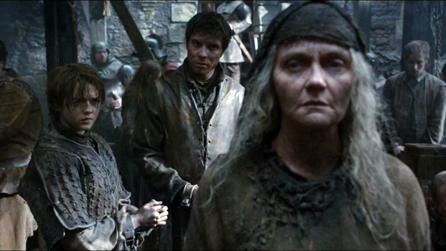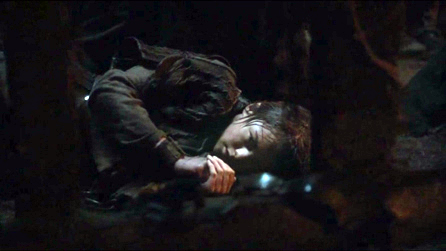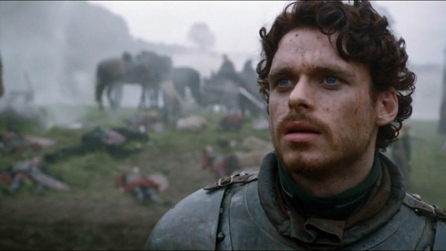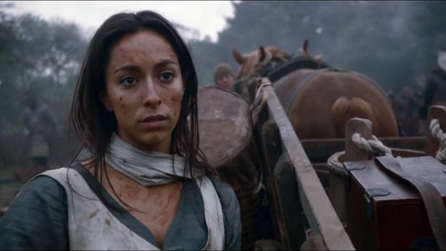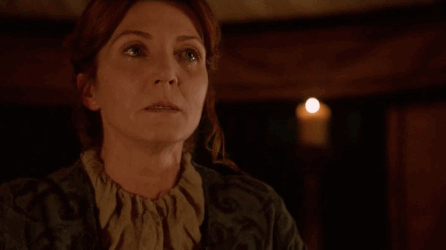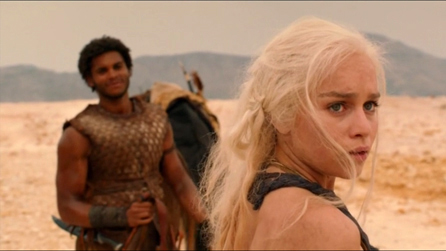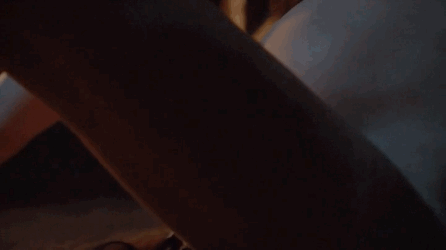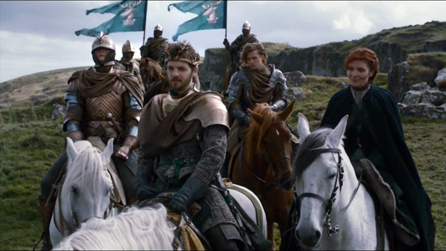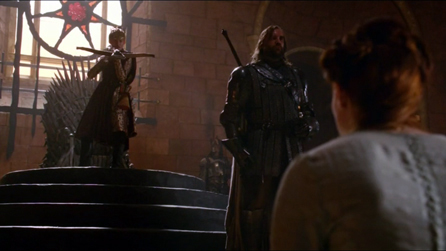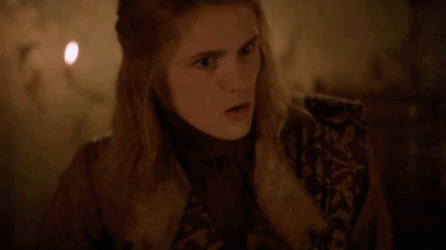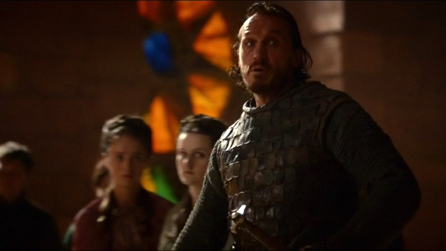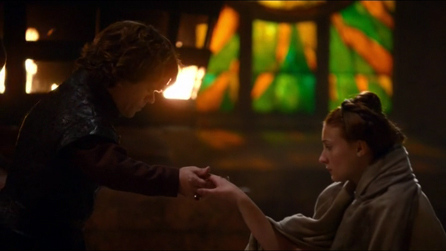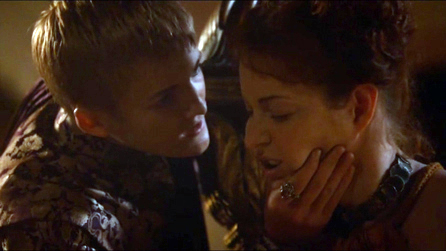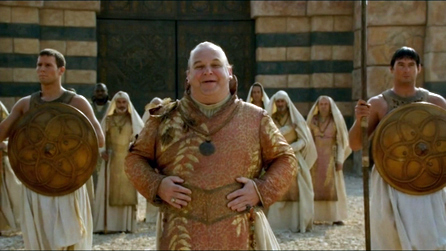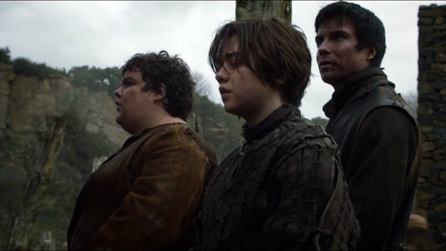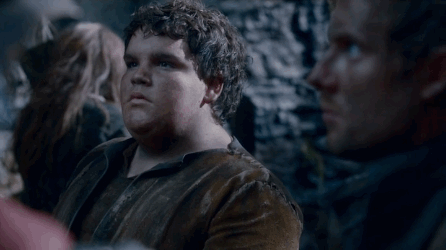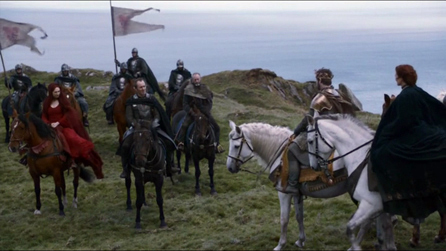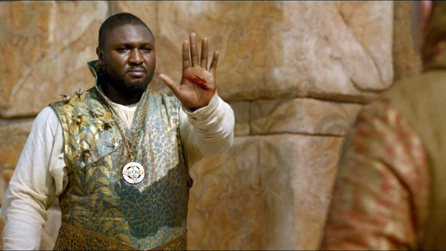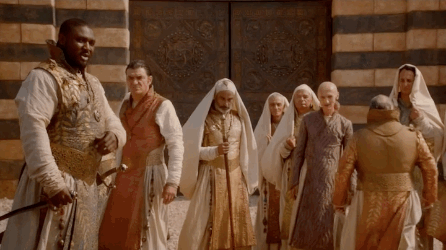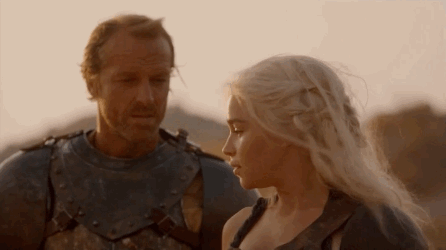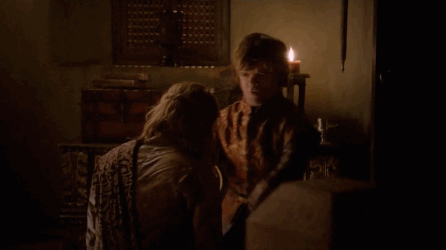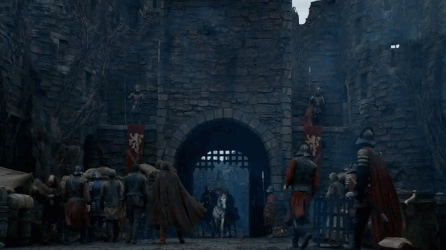THIS WEEK on Game of Thrones: “Garden of Bones”
The first time we see a Free City of Essos, far from the territories subject to the Iron Throne, we learn that the area surrounding its gates is called the ‘Garden of Bones’, so named for all those denied access to Qarth, left to die outside its walls.
More grim still, is that Sunday’s episode of Game of Thrones takes that title for its name as well. Viewers everywhere seemed to agree, the episode proved this world is becoming almost unbearably dark. The name ‘garden of bones’ juxtaposes an implied beauty or serenity — life — with the reality of death, the physicality of death; all that remains after life is gone, and Sunday was all about coming to terms with death.
Joffrey returned to the screen, ever the aggrandized tyrant, bestowing penalty on both Sansa and a gift-whore for the ‘crimes’ of others — Robb, and Tyrion respectively.
Tyrion begins his weekly cleaning-of-house by marching into the throne room to stop the first of the two travesties. Does Joff then lash out against Pycelle’s former girl only to get back at his uncle? Or also because he just hasn’t had his fill of daily flayings, torture and humiliation? The court Joffrey keeps is quickly turning rotten, especially heralded by warnings from earlier in the season that King’s Landing is slipping out of control with hunger, crime and overpopulation. If any of the contenders for the throne oust Joff, they may only have a pile of bones left to lord over themselves.
Death, death, death. “What’s that smell?” Hot Pie asks as he, Arya and Gendry stare up at Harrenhal. “Dead people,” comes Arya’s reply. They’ve come to another house of death. The other prisoners that precede Arya’s crew are veritable bags of bones themselves — hollow, empty and dead, in all the ways that might matter.
Arya watches a mother hear the last cry of her son before he’s ‘tickled’ to death by a rat feasting its way through his chest to escape his torturer’s flame (yeah, that’s what was happening in that scene), and the woman is void of emotion, broken and drained. “Does anyone live?” Arya asks a now childless mother, with as much emotional sensitivity as someone looking up a fact in a history textbook. The woman doesn’t answer. Death, death, death.
Arya’s world is darker with every episode; having a front-row seat to the torture and execution happening steps away from her holding cell is only breaking (or hardening?) her even more.
What can Arya do but pray for death itself to do her own bidding? Taking a cue from Yoren (see above, re: dead) she lulls herself to sleep at night by reciting the names of those she wishes dead. “Joffrey. Cersei. Ilyn Payne. The Hound.”
Joffrey for ordering her father dead. Cersei for failing to stop him. Ilyn, the Lannister headsman, for taking Ned’s head off with his own greatsword. The Hound for killing the butcher’s boy, one of Arya’s only friends.
It shouldn’t be a surprise that by the end of the episode, the list only grows longer.
“Joffrey, Cersei, Ilyn Payne, The Hound — Polliver”, she adds in real-time, for the guard who displays regular cruelty toward Harrenhal’s prisoners; death is coming easily to Arya now, if she’s that ready to add someone new to her death-list. And finally, “The Mountain”, Gregor Clegane, the 7 or 8-foot tall Lannister knight, for sending men and boys one ruined room over, to be interrogated, and killed.
She may find herself in a position to make good on that list soon; Tywin Lannister, the patriarch of his house and the man fabled to shit gold has taken her for a cupbearer. Strangely, like her sister, she’s been brought close to one of the many heads of the enemy beast. With luck, she’ll chop something off at first opportunity.
Chopping off rot and death is first on the agenda for Robb as he surveys fields of death (aren’t you glad I didn’t say ‘garden of bones’?) after another victorious battle against the Lannisters. ‘Five dead for every one of our own’ says one of Robb’s liege-lords. A great victory; but Robb is brought back to the reality on the ground as the healing sisters tend to his enemies.
A young soldier’s foot is dead. Mortified, rotten, and in need of amputation. A beautiful, young woman is working to chop it off, and the situation instills enough compassion in Robb to help the man, an enemy, through the ordeal. This girl, Talisa, or so she mumbles when interrogated by Robb, has had her fill of death and lets Robb become the victim of a bottled tirade on the senselessness of war, the loss of individual identity and the engine that produces fields of bone, blood and death like the one they’re standing in.
Robb’s a teenager, and amidst all the death, his hormones are still very much alive; the girl is captivating and filled with purpose, and he seems stunned into relenting to her, even if her rage is repurposed naivety, lacking a sense of pressure, command and the circumstances that beget war. She is new beauty in his present world of endless strife and violence, and that’s almost enough. He’ll risk more death to find this girl again; everything good and beautiful seems worth pursuing and holding onto now, after each of these characters has lost so much.
Catelyn Stark, once the keeper of a rich northern family, the Warden of the North and five strapping young children, is alone in a tent, in the heartland of the enemy, with a chest full of…bones.
Death, death, death.
Petyr Baelish invokes the death of her husband, and the imminent threat of death against the remnants of her family to stir her into action; Cat’s got a new choice on the table, an opportunity to save her girls, and all it would require her to do is betray the north she once called home, and release Jaime Lannister back to his own people. Treason demands death, of course. But Robb would never raise a hand, nevermind a sword to his own mother…would he? What’s a cat in a corner going to do?
Daenerys and her horde, such as they are — even Dany turns to Jorah to question the use of the term — survive becoming bones at Qarth’s gates through a strange combination of teenage boldness, intimidation and the courtesy of a stranger; welcomed into the city’s vernal oasis-wunder-plaza, they march into the most hopeful future for any character on the show at present.
And who has the least hope? Likely whoever gets targeted by the spectre of death that torturously crawls out of Melisandre’s womb. In an act that represents the beginning of life, somehow, the thing that the red priest gives birth to couldn’t better visually represent the very anti-thesis of life. Already solid, wholly formed, cold and sinewy, able to claw at her ankles, and stand seconds later, purposeful in its first moment of existence, and part of Stannis’ midnight plot against his enemies.
Who is this new shadow of death coming for?
This week’s extracurricular thoughts:
The Contest for the Throne — Heritage, Infamy, Battle Prowess, Popularity?
The two Lannister ‘cubs’ that kick off the episode are having a go of the various knights and lords of Westeros; a culture of celebrity and infamy lives here, even where ravens and the mutterings of townsfolk are the only mechanism for the spread of gossip and news.
Renly reinforces the strange viability of popularity as a means to the throne when he and Stannis parley. ‘No one wants you for their king’, he says to his fairly unpopular older brother, a man who’s had trouble mustering friends, lords and allies to rival a force anywhere near the size of Renly’s host. Renly is charismatic, young, attractive and (at least to his people), assuredly virile. Stannis on the other hand, is older and doesn’t yet have a male heir, based on Mel’s musings pre-coitus on the Painted Table. By rights, the throne is Stannis’ after Robert’s death; but how did Robert get the throne to begin with? By leading a rebellion to gut House Targaryen and oust the Mad King. And if bastards are stripped of the rights and titles of their fathers, why should Gendry’s existence even matter? If his heredity came to light, could he actually have any claim at all to the throne in this world?
The rules are variable, etched not in stone, but in a soft, malleable clay that a sword, torch or rebellion could wipe clean; everyone believes the throne is theirs for a different reason. It’s how this war started.
Five rich little nuggets from Joffrey’s Court:
1. The Hound is visually positioned between Sansa and a mad, crossbow-wielding Joffrey. He’s lent a word of aid to protect Sansa before; will he stand for her again?
2. Lancel, a cousin to Cersei, Tyrion and Jaime, and Cersei’s plaything in Jaime’s absence, is reintroduced here as a knight of the court, as an adequate preface to his dismantling at Tyrion’s hand later in the episode. Season one Bobby B, at his finest: “Lancel. Gods, what a stupid name.”
3. Bronn, now Captain of the Gold Cloaks, to Ser Meryn of the White Cloaked Kingsguard — “Careful now; we don’t want to get blood all over your pretty, white cloak.” A blatant, but necessary reminder of the strange rivalry between the two sets of knights working in King’s Landing. Bronn, Gold, brutish, sellsword, the man of dirty business, in Tyrion’s employ. Meryn, White, sworn to serve the King, one of only seven, and concerned only with the safety of the royal family, essentially in Joffrey (and Cersei)’s employ.
4. Bronn: “There’s no cure for being a cunt.” A thesis statement on Joffrey; the boy is bred for cruelty, if the first fifteen minutes of the episode didn’t properly hammer the point through your skull.
5. A beautiful, visual moment — Tyrion extending a hand to a stripped and broken Sansa Stark. It’s rare the Imp gets to gaze down upon someone; it happens here in his benevolence, and again during the peak of his wrath and cunning, with Lancel at the end of the episode.
Death, Dark, Brutal, Dark, Good God, Dark, Violence, Brutal, Dark : Ros
I don’t know what the apex of the intense Westerosi doom was on display Sunday night, but for me, it was probably watching Ros take Joffrey’s Staff of Baratheon (a legendary mace with +8 to CNT and enchanted with Dad’s-My-Uncle Essence), and deliver a crushing blow to the no doubt already-ravaged rear of Pycelle’s former receptacle in King’s Landing.
Ros, at the least, is starting to gain new purpose for us onscreen; having been Theon’s girl of choice in the north, an outlet for Tyrion on his way to the Wall, a new mistress of goings-on at Petyr’s brothel, and now, chief bedroom entertainer in the Red Keep, she’s become a means to physically bind the space of the show’s world together.
All these stories are happening in different places, sometimes never intersecting for many episodes at a time, if at all. Ros has navigated a number of these story threads, seen a number of these characters, and most importantly, been part of the suffering that’s collectively ravaged the land. She turned south away from the war on the back of a wagon last season. She was the audience’s outlet for grieving the murder of the bastards two weeks ago. And now, she is yet another face made to suffer at the hands of the cruel boy sitting the Iron Throne.
In the absence of other significance, Ros is at the least, a queer bit of rope that’s helping to remind the audience that all these stories are in fact taking place in the same world, and can spill over into one another. In Ros’ specific case, she’s also a reminder of just how hard it is to run away from the reality of death and terror in Westeros. Not even a pleasure-house or a king’s bed is safe haven.
That said, if the writing suffers anywhere on the show, it’s with most of Ros’ scenes to date; hopefully, we’ve found some value to them here at last, as the series writers’ only major character invention and maybe a possible answer to her true thematic purpose in the show.
Show us the Dragons! Show us the CG!
A stunning tracking shot opens our first truly significant series of events in Dany’s story all season; there is hope at last in Qarth.
The key to the front gates is just a mere glimpse of the dragons for the benefit of the Thirteen, a council of robed, eccentrics that lord over the free city. We can’t help but feel the man that speaks for them is asking the same question we’ve been asking for awhile; where are the dragons? May we see them? Show them to us! Validate what you are, mother of dragons!
Yeah, the budget’s being saved for bigger moments in the show. We get it. But many great things are borne out of necessity.
Or lack.
Dany won’t risk showing them, the small, still weak lizards probably only capable of roasting a s’more at this point. For the Thirteen, she has to find another way to be strong. For us, she has to remind us that we don’t only care about the girl because she has CG nukes straddling her shoulders. She is Daenerys Stormborn or some shit, and she’s a force to be reckoned with!
In an ass-backwards way, the absence of the drakes on account of the budget reinforces their present weakness; in terms of physical power in the story, they actually mean nothing to Dany and her horde. One of the Thirteen could probably slam a tome down and crush every bone in their young, infant bodies.
Dany has to convince the Thirteen of the dragons’ power, where none actually exists yet, where they can’t even muster enough fire to burn their way out of their cages. Dany, and by extension, Emilia Clarke, has to prove to us the dragons are still really there, and can still matter, whereas they probably aren’t being rendered again until much later in the season. The dragons weren’t the ‘I-WIN’ button they were made out to be at the end of the first season; they were merely a promise of power to come, and Dany still has to cultivate that power until the dragons could conceivably bear her to victory like they once did her ancestor.
Forcing her to work without the dragons is a strange boon to the character at this time. They’re a silent threat, an unseen promise of power. As long as Xaro and the Thirteen believe the potential of power rests with her and her hidden dragons, she’ll have invented that power to work with. If she can’t one day make that power manifest into something real, she’ll lose everything.
Varys’ riddle: “Power resides where men believe it resides.” That’s enough for Dany, enough for Qarth. For now.
(But yeah. Nuts to all that; we’d at least see some CG nostril-smoke flarin’ out the side of the cage if the budget were around, amirite HBO?)
Dragons Once Walked Here
The children — because they’re still children — stare up at the ruins of Harrenhal, and Gendry asks: “What kind of fire melts stone?” Arya: “Dragon fire.” An efficient way to bind the world together, strangely, like Ros’ existence does.
The dragons were here during Aegon’s landing, 300 years before Arya’s arrival at Harrenhal, and Aegon had them char the castle to cinders. Harrenhal functions as a unique reminder that the beasts were once in Westeros, and might come again. Ros can’t whore it up across the narrow sea, so the invocation of dragons is about the only way the story can forge a link between Dany’s story and the goings-on in Westeros.
Arya’s answer is another little reminder that her insight and knowledge betray a higher culture and learning than her counterparts. That could help or hinder her in countless ways. At Tywin’s side come the next chapter, it might betray her identity, which Tywin as yet doesn’t seem to comprehend. Or it may allow her to make the most of the opportunity, gleaning every bit of knowledge she can from the veritable captain of the Lannister war effort.
The Laws of Uncertainty
The Mountain, the almighty horse-decapitator of yore (now re-cast) walks toward the prisoners at Harrenhal.
Hot-Pie bravely stares him down. What are you doing, Arya asks, to which the plump target promptly replies that another boy’s strategy of staring at the massive Gregor has saved him from being picked for torture and tickling.
Hot-Pie turns back to the Mountain; peers right at him. And then, the staring boy is suddenly picked, and Hot Pie is as shocked as we are, his pie-filling running down his leg in shock over how the unproven strategy nearly got him killed.
On any other show, Hot Pie’s little strategy would have worked, and been regarded as dunce-savant brilliance, a chance for the cliché, portly, untested companion to prove he’s got some wit about him. Not so here. Never in a million years, not after the series’ once-central protagonist got his head cleaved off five episodes ago.
Anyone can get tickled. Any rule might break. Anyone can die.
Game of Thrones, like the books that bore it, is fond of reminding us how close death and danger are at all times.
Davos and Up-Culturing
Stannis almost seems a mentoring presence to Davos, instead of just his king and leader. Book readers will know this relationship was heavily dwelt on, and one scene here quickly tries to establish it. Stannis remarks on the fingerbones Davos carries in a pouch around his neck, his ‘luck’ as he calls it. Davos remarks that Stannis’ justice was, well, just, when he cut the fingers off, cleanly, and offered Davos a place in his council.
Not just a promotion in social standing, from marine criminal to royal advisor, Stannis corrects his language in their conversation on the ship’s deck: “Four fewer, not less”, in regards to Davos’ finger-stumps. Stannis has brought learning and refinement (such as it is) to Davos’ life. It’s a fair assumption from this scene that the book’s lengthy establishment of this relationship is to be carried over here. Davos shows a great deal of respect for the man, just as he did in the book, both startling when you realize Stannis took his fingers off. Clearly, he’s given him much else of value, including a more promising life for his son.
The look on Stannis’ face as he watches Melisandre’s ‘child’ being born might call that loyalty into question; will he pardon his mentor and king for birthing something like that into Westeros?
Parley, Pomp and Power
Renly and Stannis have an impromptu meeting of banners midway through the episode. Renly reminds him what the people want in a leader, and Stannis issues a fairly vacant ultimatum.
We know better than to underestimate Stannis though. Or at least, the image of him we’ve been given; not just the balding, uncharismatic, suddenly-faithful leader of a forsaken and forgotten island, but an ally of a new faith that we know has power (Mel’s otherworldly presence and proven resistance to Cressen’s poison), the convergence and consummation of their relationship (the impromptu fuck on the Painted Table), and a presence that wins the parley by virtue of the soundtrack giving victory to Dragonstone. Listen to how it drowns out the entire scene, and signifies that Stannis is the winner of the debate. There’s no question that we have to believe Stannis’ threat is real at that point. Surrender, or I’ll end this war before it starts.
Fast-forward to whatever crawls out of Melisandre’s womb at the end of the episode, and you know that Stannis wasn’t posturing. In the debate with Renly, Stannis offers to name his brother as his heir, until a son is born. The camera cuts immediately to Melisandre, who smirks knowingly, and reveals herself as pregnant a scene later. It’s fun misdirection; has an heir been accelerated to birth? Or will something else emerge from the red priestess?
The story goes with something else.
This black, shadowy thing looks tortured and restless as it stumbles into light, casting shadow on its ‘mother’ the instant it stands. It seems a sudden, new, fantastical weapon in Westeros, something akin to the turning point of the rebirth of dragons in season one; except this force is here already, and within striking distance, while Dany’s drakes are still a sea and a continent away.
Qarth to Come; Impressive Highlights of the Week
“I invoke…Sumai (?)” — fantasy nerdery at its worst. The corniest of corn that Game of Thrones has offered us yet, but alarmingly, a quick way of showing that Dany is in another world now, far from Westeros, and somehow farther still from the Dothraki and life on the plains. What world of strange traditions did she just dump her horde into?
I have nothing witty to offer; except the stark beauty of the gates opening to an oasis for her people. Sumai tastes good, as long as she treads carefully.
Also to be filed under pure rapturous joys-of-the-week, Tyrion’s masterful plays in King’s Landing, and Tywin’s heraldic arrival at Harrenhal; the true bosses of House Lannister, both hopefully having significant parts to play in the weeks to come.
This recap and series of ruminations comes late with apologies; this warden had to attend to personal wildlings this week, but the Wall’s back up and we’re back in business. We’re on equal footing with other media outlets as of next week, as it’s the common understanding that no one’s seen these next, final six episodes of the season. A common surprise for all! See you all next week.
Budrickton, First of His Name, Warden of the Actual North (Canada)




